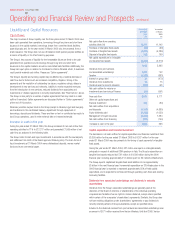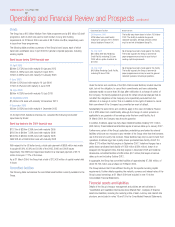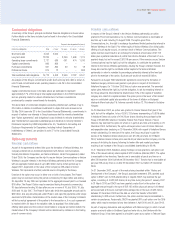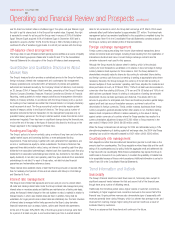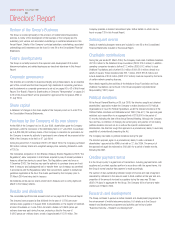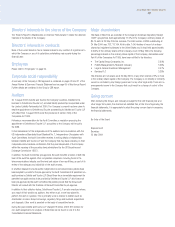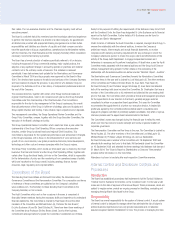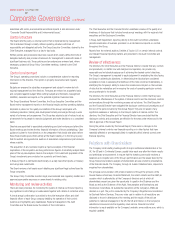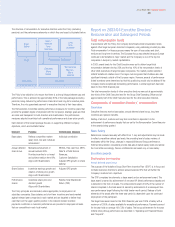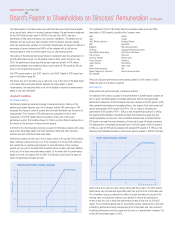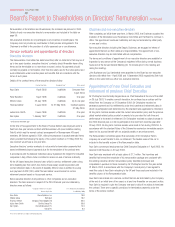Vodafone 2004 Annual Report Download - page 52
Download and view the complete annual report
Please find page 52 of the 2004 Vodafone annual report below. You can navigate through the pages in the report by either clicking on the pages listed below, or by using the keyword search tool below to find specific information within the annual report.
Introduction
The directors of the Company support high standards of corporate governance, which
are critical to business integrity and to maintaining investors’ trust in the Company.
The Company’s Business Principles (the “Principles”) define its relationships with its
stakeholders and govern how Vodafone conducts its business. Amongst other things,
the Principles state that the Company expects all its employees to act with honesty,
integrity and fairness. The Company also promotes the Principles to its associate
companies (where Vodafone holds a minority stake) and to its business partners and
suppliers.
The Company’s ordinary shares are listed in the United Kingdom on the London Stock
Exchange. As such, the Company is required to make a disclosure statement
concerning its application of the Principles of and compliance with the provisions of
the Combined Code on corporate governance that is appended to the Financial
Services Authority’s Listing Rules.
During the year, the Financial Reporting Council, which is responsible for maintaining
the Combined Code, approved a revised Combined Code taking into account the
recommendations of the Higgs Review of the role and effectiveness of non-executive
directors and a separate report by Sir Robert Smith in relation to Audit Committees.
The revised Combined Code became effective for companies’ financial periods
beginning on or after 1 November 2003, and therefore, for the Company, will apply
from the financial year which began on 1 April 2004.
For the financial year ended 31 March 2004, the directors confirm that the Company
has been in compliance with the provisions of the Combined Code effective for that
accounting period. The disclosures provided below are nevertheless intended to
provide the reader with an explanation of how the Company’s corporate governance
practices measure against the revised Combined Code as if it were currently in effect
for the Company.
The Company’s American Depositary Shares (“ADSs”) are listed on the NYSE and the
Company is therefore subject to the rules of the NYSE as well as US securities laws
and the rules of the SEC. Pursuant to recently revised NYSE corporate governance
rules, Vodafone, as a foreign private issuer, is required to summarise significant
differences between the corporate governance provisions of the NYSE applicable to US
companies and the corporate governance principles applicable to it and followed by it
in the UK. In compliance with the new rules, the Company will provide an appropriate
summary in its Annual Report for the year ending 31 March 2005. In July 2002, the
US Congress passed the Sarbanes-Oxley Act which, together with consequent
adoption of new rules by the SEC, has introduced a number of changes to the
corporate governance requirements on both US domestic companies and non-US
registered issuers such as the Company. During 2003, the Company established a
Disclosure Committee with responsibility for reviewing and approving controls and
procedures over the public disclosure of financial and related information, and other
procedures necessary to enable the Chief Executive and Financial Director to provide
their Certifications of the Annual Report on Form 20-F that is filed with the SEC. The
Company also adopted a corporate code of ethics for senior financial officers,
separate from and additional to the Principles. A copy of the code of ethics and the
Principles are available on the Company’s website (www.vodafone.com). The Company
has already begun the work required to ensure compliance with section 404 of the
Sarbanes-Oxley Act, which is required in its financial year ending 31 March 2006.
Directors and Organisation
The Company’s Board of directors presently consists of fifteen directors, fourteen of
whom served throughout the year ended 31 March 2004. As at 31 March 2004, in
addition to the Chairman, Lord MacLaurin, there were six executive directors and eight
non-executive directors. The Deputy Chairman, Paul Hazen, is the nominated senior
independent director and his role includes being available for approach or
representation by directors or significant shareholders who may feel inhibited from
raising issues with the Chairman. He is also responsible for conducting an annual
review of the performance of the Chairman and, in the event it should be necessary,
convening an annual meeting of the non-executive directors.
Sir Christopher Gent retired as a director at the conclusion of the AGM on
30 July 2003. Dr John Buchanan and Luc Vandevelde joined the Board as non-
executive directors on 1 April 2003 and 1 September 2003, respectively. The
Company considers all its present non-executive directors to be fully independent. The
executive directors are Arun Sarin (Chief Executive), Julian Horn-Smith, Peter Bamford,
Vittorio Colao, Thomas Geitner and Ken Hydon.
The Company’s Articles of Association provide that every director who was elected or
last re-elected at or before the AGM held in the third calendar year before the current
year shall automatically retire. Accordingly, Peter Bamford, Julian Horn-Smith and
Sir David Scholey will be retiring and, being eligible, will offer themselves for re-
election at the Company’s AGM to be held on 27 July 2004. The Company’s Articles of
Association also provide that every director appointed to the Board since the last AGM
shall retire. Therefore, Luc Vandevelde will retire and, being eligible, will offer himself
for re-election.
Performance evaluation of the Board, its Committees and individual directors takes
place on an annual basis and is conducted within the terms of reference of the
Nominations and Governance Committee. The Chairman leads the assessment of the
non-executive directors, the Chief Executive reviews the executive directors and the
senior independent director conducts the review of the performance of the Chairman.
Each Board Committee undertakes a review of its work and in relation to the
performance of the Board, the Chairman invites suggestions from all directors as to
ways in which the Board and its processes may be improved. A series of
questionnaires is being developed to facilitate the evaluation processes for the current
and future years, each of which has been, and will in the future be, conducted without
the assistance of external consultants.
This year particular attention was paid to the contributions made by directors requiring
to offer themselves for re-election at the AGM and the Nominations and Governance
Committee confirmed to the Board that the performance of each such director
continued to be effective and, therefore, the Company should support their re-election.
The Board met on eight occasions in the financial year to 31 March 2004. Individual
directors’ attendance was: Lord MacLaurin (8), Paul Hazen (7), Arun Sarin (8),
Julian Horn-Smith (8), Peter Bamford (7), Vittorio Colao (8), Thomas Geitner (8),
Ken Hydon (8), Dr Michael Boskin (8), Professor Sir Alec Broers (8), Penny Hughes (8),
Sir David Scholey (8), Dr John Buchanan (8) and Professor Jürgen Schrempp (6).
Since Mr Vandevelde joined the Board there have been six Board meetings in the
financial year and he attended five. In addition to the regular Board meetings, there
were a number of other meetings to deal with specific matters. Directors unable to
attend a Board meeting because of another engagement, as was the case for four
directors in the year, are nevertheless provided with all the papers and information
relevant for such meeting and are able to discuss issues arising in the meeting with
the Chairman or the Chief Executive.
The Board provides the effective leadership and control required for a listed company.
Actual financial results are presented to each meeting, together with reports from the
executive directors in respect of their areas of responsibility. The Chief Executive
presents his report to each meeting which deals, amongst other things, with investor
relations, giving Board members an opportunity to develop an understanding of the
views of major investors. From time to time, the Board receives detailed presentations
from non-Board members on matters of significance or on new opportunities for the
Group. Financial plans, including budgets and forecasts, are regularly discussed at
Board meetings. The non-executive directors periodically visit different parts of the
Group and are provided with briefings and information to assist them in performing
Vodafone Group Plc Annual Report 2004
50
Corporate Governance


